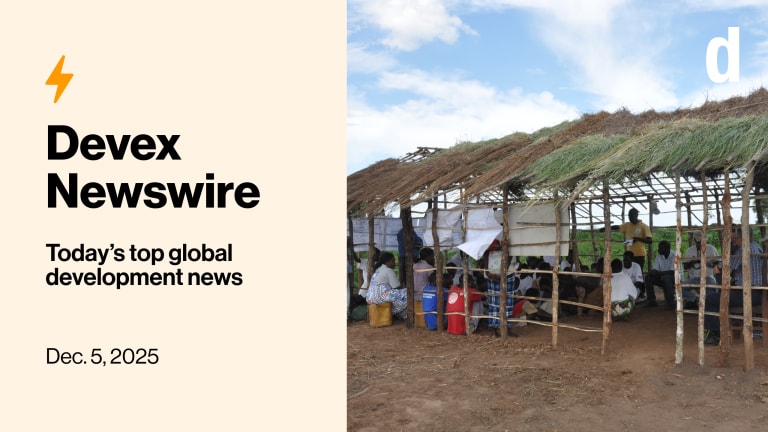US foreign service career tracks: What you need to know
Budding development professionals seeking employment in U.S. government should look beyond the usual suspects. The State Department offers several interesting career tracks.
One of the most important decisions in an aspiring diplomat’s career is made even before taking the exam. At registration, applicants must choose one of five career tracks (or “cones”) that is to define the trajectory of their career. “There’s a lot of misconception out there about some of the career tracks that we have,” said Luis Arreaga, director of the U.S. State Department’s Office of Recruitment, Examination and Employment. Here’s a quick rundown for budding development professionals seeking employment in U.S. government: Economic Broadly speaking, economic officers work to promote trade and development policies favorable to U.S. interests. According to one economic officer, people with development backgrounds are usually drawn to this track, as they are the most familiar with the complex economic issues facing developing nations. Robert Dry, a senior foreign service officer, said one trait that is critical to succeeding as an economic officer is versatility. The work of an economic officer often entails an especially wide range of projects and responsibilities, he noted. For instance, in working for the Foreign Commercial Service, an economic officer often acts as a liaison for any U.S. government agency that foreigners need to contact for business purposes. Dry’s own career highlights in the economic track include working with the U.S. Department of Agriculture and the National Science Foundation, combating mango blight in Oman and helping to organize disaster relief aid in the wake of the 1999 floods in Vietnam. Management Management officers focus less on foreign policy and more on the day-to-day operations of running an embassy, from human resources to procurement. According to Arreaga, the management track may be particularly attractive to those with master’s degrees in business administration or experience administering development projects, or both: “Think of a corporation that has 280-plus offices worldwide,” he said. “Think about the infrastructure that you need to support that.” By offering training in foreign languages and cross-cultural communication, the management track allows diplomats to develop business skills that are in high demand but harder to come by in the private sector. Management officers tend to rise through the ranks the most quickly, according to Arreaga. Public diplomacy As the name implies, public diplomacy officers work to promote a positive image of the United States to the general public. This position often involves interacting with the local press, writing speeches, and issuing statements about U.S. foreign policy. But public diplomacy officers are more than spokespersons; they often get involved in efforts that may directly appeal to development professionals, such as coordinating cultural exchanges and scholarship programs. Some embassies’ public affairs offices directly run grant programs, such as the Democracy Commission small grants, which promote independent media, government transparency, and the rule of law. Consular Consular officers handle many of the embassy functions that outsiders are most familiar with: assisting American citizens abroad and issuing visas to prospective visitors to the United States. According to State Department recruiters, the consular track has got a bad rap. Maybe it’s because new diplomats are compelled to spend a year doing consular work during one of their first two tours of duty, or perhaps it’s because the crowded waiting room with staff shielded behind bullet-proof glass windows is a little too reminiscent of the Department of Motor Vehicles. In any case, the consular track is the least competitive but, according to Arreaga, this does not mean it’s the least interesting. Consular officers may end up visiting U.S. citizens in prisons abroad, tracking down parents who have fled the U.S. to avoid child support payments, and coordinating adoptions from far-flung orphanages. Consular officers have the most direct interaction with the local population, Arreaga noted: They often have the best stories to tell and are able to “get the pulse of the country” more quickly than other diplomats. Deborah Graze, chief of outreach and coordinator of the U.S. Diplomats in Residence program, stressed that issuing visas is a serious responsibility since consular officers are legally enshrined as the main gatekeepers determining who should be allowed to enter the country. Another diplomat observed that junior officers in the consular track usually end up with substantial management responsibilities, as they are often called upon to oversee local staff who process visa requests. Political This track is by far the most competitive, fueled in part by the rumor that political officers have the best shot at becoming ambassador. (Arreaga emphatically stressed there’s no data to prove this.) Political officers deal in statecraft, reporting back to Washington on trends within the governments and societies of their post. Back in Washington, political officers often serve on a country desk, the office responsible for handling each bilateral relationship at the State Department headquarters. International relations junkies may be particularly drawn to the political track, though it seems fair to say that these officers are less directly engaged in development than those following another employment track at State. Detailed descriptions of the tracks are found on the State Department website, where candidates can also take a quiz that suggests a suitable track. Arreaga suggested connecting with a diplomat in residence who can provide unbiased information about the various career tracks.
One of the most important decisions in an aspiring diplomat’s career is made even before taking the exam. At registration, applicants must choose one of five career tracks (or “cones”) that is to define the trajectory of their career.
“There’s a lot of misconception out there about some of the career tracks that we have,” said Luis Arreaga, director of the U.S. State Department’s Office of Recruitment, Examination and Employment.
Here’s a quick rundown for budding development professionals seeking employment in U.S. government:
This article is exclusively for Career Account members.
Unlock this article now with a 15-day free trial of a Devex Career Account. With a Career Account subscription you will get:
- Full access to our jobs board, including over 1,000 exclusive jobs
- Your Devex profile highlighted in recruiter search results
- Connections to recruiters and industry experts through online and live Devex events
Start my 15-day free trialAlready a user?
Printing articles to share with others is a breach of our terms and conditions and copyright policy. Please use the sharing options on the left side of the article. Devex Pro members may share up to 10 articles per month using the Pro share tool ( ).








